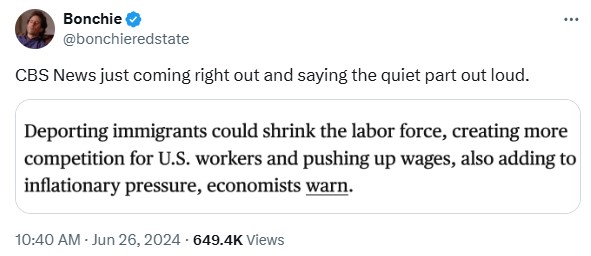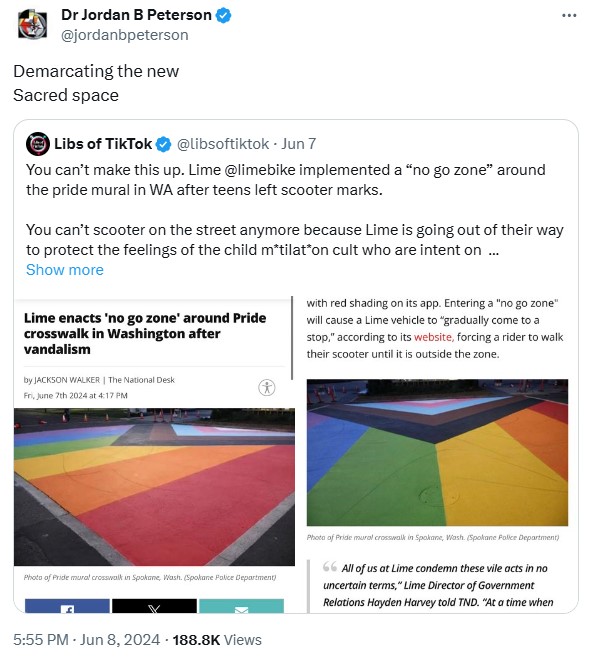Democrat Speaker of the House Joseph Shekarchi made an interesting statement in passing on a recent episode of WPRI’s Newsmakers. The spectacle of the state’s top political official instructing a journalist about how to lobby is worth noting, but this is the particular comment I mean, immediately after the speaker referenced the Access to Public Records Act (APRA) being “abused”:
A lot of private companies use this APRA request to get information, repackage it, and sell it.
I’ve reached out to the House’s spokesman last week to for more specifics about what Shekarchi meant but have received no response. He could mean sites like Anchor Rising that create data visualization tools to better inform the public, or he could mean something even more commercial and specific to certain industries. In either case, I have to ask: How is this abuse?
If there’s money to be made from public information, that’s evidence it has value, and if a private company is able to find information and present it in a way for which others are willing to pay, that simply means that more people are benefiting from the transparency.
[Open full post]The explanation is worth a read in full:
Maybe you’re not convinced. Perhaps you’re inclined to agree with former U.S. ambassador to Russia Michael McFaul, who tweeted in May, “Hamas has nothing in common at all with liberal or progressive values.” If you think he has a point, look more closely at those protesting in sympathy with Hamas. You’ll find every color in the identity rainbow. Black Lives Matter, LGBTQ groups, intersectional feminist organizations, and others salute October 7 as righteous resistance and condemn the Israeli response as genocide. If you still find it strange that people nominally committed to the defense of minorities, women, and the transgendered are supporting a racist, male-supremacist, anti-gay terrorist regime, you’ve missed the purpose of social justice: to “finally shake off this noxious ruling order all together.” This necessarily means destroying the Jewish state, laying waste to the U.S. as we know it, and deifying the enemies of both.
As the saying goes, the issue is never the issue. The revolution is always the issue. These groups unite comfortably in hatred of you and a wish to dominate you and everything you’ve built.
I suspect if we let it come to it, the jihadists will defeat the wokesters, but we shouldn’t let it come to that just to find out.
[Open full post]This tweet reminds us, incidentally, that it makes a difference where inflation enters the economy, particularly in whom it benefits:
If inflation results from an increase in the monetary supply, there’s more money floating around for the same goods and services, and the benefit tilts from the top down (starting with investor types), and effect is everywhere money is spent. If a reduced workforce means businesses have to pay more to attract workers, they have to charge customers more for products that utilize low-skilled labor, and workers with more money will tolerate higher prices on the goods they buy.
Who benefits in the latter scenario isn’t obvious, but the distinction raises two points worth considering. First, big-government politicians seem to prefer that everything be top-down, including reaping the benefits of their policies. And second, it’s insane to expect human beings to manage these things as if they’re turning knobs on a control board.
[Open full post]Among the most effective — which is to say, “diabolical” — techniques for advancing radicalism that I’ve observed in my years of reading state-level legislation is to float vaguely between what a bill does in specific and what it does in reality. I have in mind the “Healthcare Provider Shield Bill” that the Rhode Island General Assembly and Governor Daniel McKee passed into law this session (H7577A in the House and S2262B in the Senate). Not long ago, I suspect, this bill would have tripped over its own extremism, but our politicians and news media are so ideologically conquered that none will bother to explain it sufficiently to allow Rhode Islanders to decide for themselves.
Part of the problem is that it’s nearly 20 pages of thick legalism. The reader must be accustomed to reading such things to untangle the ways in which ideological politics is interwoven even with the language. For instance, the “providers” whom it “shields” are defined as “aggrieved person[s]” who have “aid[ed] and assist[ed] legally protected healthcare activity.” To appreciate how this functions as activism, read the definition of the latter term (“legally protected healthcare activity”):
The undertaking of any act or omission to aid or effectuate, or attempt to aid or effectuate, any person in the exercise and enjoyment, or attempted exercise and enjoyment, of the right to transgender healthcare services or reproductive healthcare services in this state, regardless of the patient’s location or whether the healthcare provider is licensed in the state where the patient is located at the time the service is rendered; or
The undertaking of any act or omission to aid or effectuate, or attempt to aid or effectuate, any person in the provision of, or attempted provision of, transgender healthcare services 19
or reproductive healthcare services in this state, regardless of the patient’s location or whether the healthcare provider is licensed in the state where the patient is located at the time the service is rendered.
What advocates claim the “shield bill” does, in specific, is to protect Rhode Island healthcare providers who provide services that, whether you like them or not, are legal within the state. The supposed protection is ostensibly from victimization by some crazy MAGA state that passes legislation allowing its citizens to harass and persecute those Rhode Island providers.
I try to resist falling into the literary analysis for which I was trained at such great expense, but in this case, it’s unavoidable. Let’s begin with the deceptive use of the term “aggrieved person.” In general law, as Black’s Law Dictionary makes explicit, “aggrieved” means “having suffered loss or injury.” Ordinarily, one might expect the fact of being aggrieved to be a matter to be proven elsewhere. In this bill, however, it’s simply a propagandistic term to imply innocence on the person’s part and the guilt of the other party. An “aggrieved person” is simply “a person against whom hostile litigation is filed.”
That sounds bad, doesn’t it? We all know what “hostile” means. But again, in this bill, it’s more a term of art: “hostile litigation” is simply “litigation or other legal action, including, but not limited to, administrative action, to deter, prevent, sanction, or punish any person engaging in legally protected healthcare activity.” Let’s suppose Connecticut decides that a 12-year-old girl who begins claiming she’s a boy must have a minimum of two psychological evaluations over the course of six months (I’m setting a deliberately low bar, here) and parental consent before butchers can sterilize her and then filet her thigh for material to craft something that looks like a stuffed-animal phallus with her own flesh, while Rhode Island determines that a 15-minute one-on-one consultation with a radical activist is sufficient. If some agency in Connecticut were to disallow the Rhode Island activist from working in that state in order to lure girls across the border, that would be “hostile litigation.”
Now suppose a girl who is lured across state lines then, after turning 13, realizes that she was merely going through a horrible phase and is experiencing all sorts of physical and psychological side effects for which the Rhode Island butchers did not adequately inform or prepare her. If her family tries to sue the butcher, that, too, would be “hostile litigation,” and the butcher would be an “aggrieved person.”
You can see how diabolical the technique is. We’re barely a page into the legalisms, and we already have multiple definitions and hypotheticals in which activists could tangle anybody who objects by spouting nuances and lies about what is or isn’t covered. The truth is that they don’t really know or care what’s covered. Invariably, they’ll insist on their own intent as justification while ignoring the true purpose of the bill, which is to intimidate anybody who doesn’t favor butchering children by placing all sorts of risk on them. They’ll cite the brief disclaimer that providers are not made immune to malpractice under Rhode Island law, but their victims will face huge expense and anxiety when seeking justice for anything but the most undeniable butchery.
It’s not only the victims who face such risks. The legislation absolutely forbids business entities incorporating in Rhode Island from providing any “records, information, facilities, or assistance” in response to a “subpoena, warrant, court order, or other civil or criminal legal process” related to “hostile litigation.” Imagine a small-business owner in Rhode Island who wants to help the Connecticut girl described above by agreeing to confirm in a deposition or affidavit that she was in the state on a particular date. He or she would be breaking the law to voluntarily comply. The penalty isn’t stated, but one presumes losing the ability to remain a registered business is in the mix. What business would be willing to risk that?
This goes well beyond legal protection for Rhode Island providers adhering to state law. It creates restrictions and risks for other Rhode Islanders because they are less favored. On a similar theme, note that the bill specifically excludes “conversion therapy” from the definition of “gender-affirming health care services.” As I predicted when the General Assembly and then-Governor Gina Raimondo banned conversion therapy in the state in 2017 (see here and here), RI Democrats’ respect for the rights of people to define their identities, and to seek or provide professional help along those lines, goes only one way. Any providers who try to help minors deal with unwanted feelings of same-sex attraction or gender dysphoria risks censure and loss of license.
Rhode Island law is enforcing a radical religion, not respecting professionals’ expertise and patients’ rights.
That is the doing of Governor Daniel McKee of Cumberland, who wants to restrict the rights of children and families in order to protect butchers. It is the doing of House Speaker Joseph Shekarchi of Warwick, who wants to restrict the rights of children and families in order to protect butchers. It is the doing of Senate President Dominick Ruggerio of North Providence, who wants to restrict the rights of children and families in order to protect butchers. It is the doing of House sponsor John Edwards of Tiverton, who wants to restrict the rights of children and families in order to protect butchers. It is the doing of Senate sponsor Dawn Euer of Newport, who wants to restrict the rights of children and families in order to protect butchers. And it is the doing of the following legislators who voted for the bill:
- House: Shekarchi, Abney, Ackerman, Ajello, Alzate, Batista, Bennett, Biah, Blazejewski, Boylan, Caldwell, Carson, Casey, Casimiro, Cortvriend, Cotter, Craven, Cruz, Dawson, DeSimone, Donovan, Edwards, Felix, Finkelman, Fogarty, Giraldo, Handy, Henries, Kazarian, Kislak, Knight, Lombardi, Marszalkowski, McEntee, McGaw, McNamara, Messier, Morales, O’Brien, Potter, Sanchez, Shallcross Smith, Shanley, Slater, Solomon, Speakman, Spears, Stewart, Tanzi, Voas.
- Senate: Ruggerio, Acosta, Bell, Bissaillon, Britto, Burke, Cano, Ciccone, DiMario, DiPalma, Euer, Felag, Gallo, Gu, Kallman, LaMountain, Lauria, Lawson, Lombardi, Mack, McKenney, Miller, Murray, Pearson, Quezada, Sosnowski, Tikoian, Ujifusa, Valverde, and Zurier.
Add to the list those individuals and organizations who submitted testimony in favor of the legislation, including (shamefully) RI Kids Count and Attorney General Peter Neronha, whose meager letter doesn’t find space to mention even one concern about legalities or rights.
Shame on you all.
Featured image by Justin Katz using Dall-E 40.
[Open full post]I’ve been mystified by young(er) adults’ absolute panic about “climate change” in the face of actual experience and the extended timelines of real problems, if they were real. Then I recently watched The Day After Tomorrow for the first time, and I wondered how huge an impact that movie (and the myriad lesser copies that have no doubt permeated our society for decades) had.
The fundamental premise is that climate scientists are wrong not in their warnings of danger, but in their comforts that we have years, decades, or centuries to adapt and prepare. The movie invents a mechanism that brings calamity to half the planet within a month, and in the nature of propaganda, it doesn’t matter how thin the explanation is. It only matters that people suspend their disbelief sufficiently to let the images into their minds. A new ice age not only changes from feeling in conflict with “global warming” to feeling — somehow — connected to it, and slowly creeping glaciers are replaced with the prospect of burning books in the local library for warmth next week.
As George MF Washington writes in The Pipeline:
“The Day After Tomorrow” came along at a critical time for the environmental movement. The propaganda value of the term “Global Warming” had begun to fail. The planet simply wasn’t getting hot enough fast enough, and folks who were still capable of critical thinking had begun to look askance at things like the “hockey stick” graph. The climate movement was desperate to incorporate extreme weather events into its campaign in order to ratchet up the fear factor, but regular Americans just couldn’t wrap their brains around the idea that extreme cold, hurricanes and tornadoes could be created by the same phenomenon that was supposed to be making the Earth hotter and raising sea levels.
The movie feels like an alien invasion film, but its political utility has us sacrificing our economic well-being on a crusade similar, in its response, to building giant space lasers because an invasion could actually come any day.
[Open full post]I appreciate Ken Block’s intellect and civic engagement, but his political commentary leaves much to be desired. Consider this, from the end of a long recent tweet:
I cannot imagine either of these candidates effectively dealing with a crisis, commanding the situation room, keeping the complexities of a crisis fully in their heads, ready to interact with other world leaders who have far better mental capabilities than our candidates do at this point.
What the heck are we doing? Partisan nonsense has left us with no candidate for those who want to elect a leader in this next election.
Note the implicit progressive, technocratic belief that there exist people who can keep all the complexities that go into presidential decision-making fully in their heads, and that international relations is a battle of intellect. It is a common (and dangerous) trap for smart people to think that reason rules reality.
We’d do better to think of elected representatives as avatars of the people. We don’t want a benevolent dictator who can absorb and process every detail as in the classic Saturday Night Live skit of President Reagan as a mastermind. We want people who will react as we would in a given situation, preferably more often than not as we would on our best days.
We’re in our current predicament because the expert class increasingly refuses to accept the desires and interests of the rest of us.
[Open full post]Because progressives have driven conversations about taxes for much of the last century, our thinking is all askew. Characteristic of their approach is to focus on who is giving and receiving the money. This isn’t surprising, because like Karl Marx in their personal life, they’re obsessed with other people giving them money, but it generates the sense that momentary identities are decisive, like immutable states that aren’t affected by behavior and changing circumstances.
(Naturally, progressives will move people into different categories when it suits them. We’re really observing, here, a simplicity of mind.)
Taxes are structural within a system. They are meant to pay for those activities the system requires but for which it will not generate revenue if it’s not built in. Therefore, the question ought to be what is generating money and what are government’s legitimate claims of contributing to having an in those revenue streams.
How it affects the system to take taxes out in a certain way or place is of course a consideration, but I’d argue it should be secondary. To make it primary is to cede the conceit of experts who can make decisions that have no effect on decision-making itself. In other words, choosing to tax X rather than Y because X has less of an observable effect on the natural operation of the economy establishes that the decision should be based on the experts’ judgment, not on something intrinsic within the system, such as the fundamental alignment of, say, government with the real estate that sets its boundaries.
[Open full post]Maybe some Millennials are too young to remember, but the ability of government school students to wear whatever t-shirts they wanted was once a major theme in the mainstream media. These days, we’re learning that it’s highly dependent on the message of the shirt:
In 2023, the seventh grader at John T. Nichols Middle School was told he could not wear a shirt to class with the phrase “There Are Only Two Genders” printed on the front, as it was in violation of the school’s dress code. …
According to the school’s dress code, “clothing must not state, imply, or depict hate speech or imagery that target[s] groups based on race, ethnicity, gender, sexual orientation, gender identity, religious affiliation, or any other classification.” Carolyn Lyons, superintendent of the Middleboro Public Schools System, explained to the student’s father that the shirt in question “was understood to ‘target students of a protected class; names in the area of gender identity.’”
This was always the obvious end-game of “hate speech” rules. Once you can ban speech based on the subjective interpretation that it is “hateful,” all that remains is to define criticism of your beliefs as “hate.”
People of integrity who believe in civil rights and freedom should be done playing these games.
[Open full post]On WNRI 1380 AM/95.1 FM, John DePetro and Justin Katz discuss:
- America realizing the Biden deception
- RI labor loves them a hollow figurehead
- Rapid inflation of Washington Bridge demolition
- Frias steps out of GOP spotlight
Featured image by Justin Katz using Dall-E 40 and Photoshop AI.
[Open full post]Jordan Peterson has this right, but the darkness of the fact needs to be emphasized:
We’ve been seeing teens charged with felonies for riding over these sections of road disrespectfully, even as Hamas supporters get away with defacing statues. It’s obvious we’re being demanded to treat these symbols with reverence, as if they’re the state religion, but this religion has an important, tyrannical difference.
I wouldn’t want an image of our Lord painted on the street precisely because it couldn’t do otherwise than be defaced. These people paint their sacred symbols on the road explicitly so that they can force people to treat them gingerly. They even put up cameras to keep a watch for transgressors.
In keeping with the notion of “pride” as a high virtue to be celebrated, the purpose is to be in your face while making you take off your shoes and bow down. This is the deepest form of tyranny.
[Open full post]





